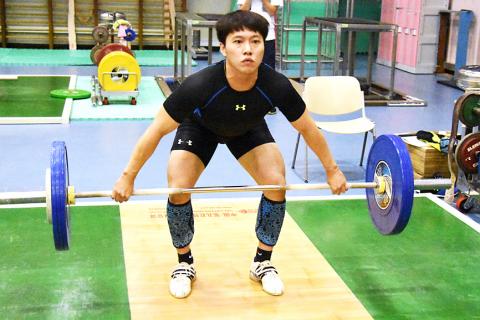Chinese Taipei Olympic Committee vice president Steven Chen on Tuesday apologized after weightlifter Lin Tzu-chi (林子琦) was suspended because of an abnormal doping test, costing the nation a strong medal chance.
Lin was considered a gold-medal contender in the women’s 63kg division on Tuesday, but her absence opened the way for her main rival, Deng Wei (鄧薇) of China, to win the gold with a record-breaking combined total of 262kg.
The previous record, 261kgs, was set by Lin at the Asian Games in 2014, but her performance has slipped since then. She placed sixth at the World Weightlifting Championships in November last year, with a combined lift of 238kgs.

Photo: Liao Yu-wei, Taipei Times
“As the leader of Taiwan’s Olympics delegation, I take full responsibility for a failure to win a medal in the weightlifting event,” Chen said. “We disappointed everyone in Taiwan.”
The delegation decided to pull Lin from the competition after receiving a report on Friday last week that indicated abnormalities in a doping test.
“Taiwan always follows the highest standards in doping tests to ensure that competition is fair and protect athletes’ rights,” Chen said. “So we have decided to temporarily suspend Lin Tzu-chi from competition and make it clear to everyone that there is no room for compromise on doping.”
Chen said that the decision was based on guidance from the World Anti-Doping Agency (WADA).
Chen quoted weightlifting team coach Tsai Wen-yi (蔡溫義) as saying he was saddened by news of the test results.
It was not the first time Lin failed a doping test. She tested positive for taking a banned substance before the 2010 Asian Games, and while she insisted she had mistakenly taken an illegal drug, she was suspended for two years.
Sports Administration Director-General Ho Jow-fei (何卓飛), who is in Rio de Janeiro, also expressed regret over the situation.
Ho said Lin was one of the athletes under close watch by the International Weightlifting Federation (IWF) and any tests involving her drew attention from the federation.
He said the test was done in Taiwan before the Olympic Games and sent to Japan for testing.
The results came back on Friday and Japan sent a copy to the IWF, he said, adding that there are test results of other athletes that have yet to arrive.
“WADA requires that if an abnormal test is confirmed, then the athlete must be temporarily suspended from competition,” Ho said.
“We had to make this decision, as regrettable as it is. We also call on athletes to be careful in what they use,” Ho added.
The test result was not immediately made public to prevent it from affecting the morale of Hsu Shu-ching (許淑淨) and Kuo Hsing-chun (郭婞淳) in their weightlifting events on Sunday and Monday respectively, Chinese-language media said.
The delegation said Lin’s suspension would make it harder for Taiwanese athletes to achieve the goal set by the Sports Administration of three golds, two silvers and bronze for the Rio Games.
At press time last night, Taiwan had won three medals: a gold and a bronze in women’s weightlifting and a bronze medal in the women’s team event in archery.

CHAOS: Iranians took to the streets playing celebratory music after reports of Khamenei’s death on Saturday, while mourners also gathered in Tehran yesterday Iranian Supreme Leader Ayatollah Ali Khamenei was killed in a major attack on Iran launched by Israel and the US, throwing the future of the Islamic republic into doubt and raising the risk of regional instability. Iranian state television and the state-run IRNA news agency announced the 86-year-old’s death early yesterday. US President Donald Trump said it gave Iranians their “greatest chance” to “take back” their country. The announcements came after a joint US and Israeli aerial bombardment that targeted Iranian military and governmental sites. Trump said the “heavy and pinpoint bombing” would continue through the week or as long

TRUST: The KMT said it respected the US’ timing and considerations, and hoped it would continue to honor its commitments to helping Taiwan bolster its defenses and deterrence US President Donald Trump is delaying a multibillion-dollar arms sale to Taiwan to ensure his visit to Beijing is successful, a New York Times report said. The weapons sales package has stalled in the US Department of State, the report said, citing US officials it did not identify. The White House has told agencies not to push forward ahead of Trump’s meeting with Chinese President Xi Jinping (習近平), it said. The two last month held a phone call to discuss trade and geopolitical flashpoints ahead of the summit. Xi raised the Taiwan issue and urged the US to handle arms sales to

State-run CPC Corp, Taiwan (CPC, 台灣中油) yesterday said that it had confirmed on Saturday night with its liquefied natural gas (LNG) and crude oil suppliers that shipments are proceeding as scheduled and that domestic supplies remain unaffected. The CPC yesterday announced the gasoline and diesel prices will rise by NT$0.2 and NT$0.4 per liter, respectively, starting Monday, citing Middle East tensions and blizzards in the eastern United States. CPC also iterated it has been reducing the proportion of crude oil imports from the Middle East and diversifying its supply sources in the past few years in response to geopolitical risks, expanding

An Emirates flight from Dubai arrived at Taiwan Taoyuan International Airport yesterday afternoon, the first service of the airline since the US and Israel launched strikes against Iran on Saturday. Flight EK366 took off from the United Arab Emirates (UAE) at 3:51am yesterday and landed at 4:02pm before taxiing to the airport’s D6 gate at Terminal 2 at 4:08pm, data from the airport and FlightAware, a global flight tracking site, showed. Of the 501 passengers on the flight, 275 were Taiwanese, including 96 group tour travelers, the data showed. Tourism Administration Deputy Director-General Huang He-ting (黃荷婷) greeted Taiwanese passengers at the airport and